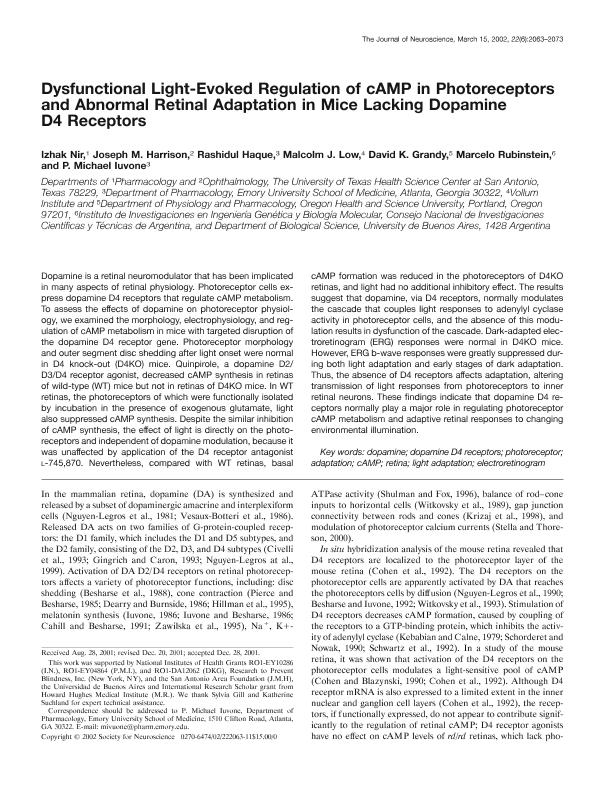Artículo
Dysfunctional Light-Evoked Regulation of cAMP in Photoreceptors and Abnormal Retinal Adaptation in Mice Lacking Dopamine D4 Receptors
Nir, Izhak; Harrison, Joseph M.; Haque, Rashidul; Low, Malcolm J.; Grandy, David K.; Rubinstein, Marcelo ; Iuvone, P. Michael
; Iuvone, P. Michael
 ; Iuvone, P. Michael
; Iuvone, P. Michael
Fecha de publicación:
03/2002
Editorial:
Society for Neuroscience
Revista:
Journal of Neuroscience
ISSN:
0270-6474
Idioma:
Inglés
Tipo de recurso:
Artículo publicado
Clasificación temática:
Resumen
Dopamine is a retinal neuromodulator that has been implicated in many aspects of retinal physiology. Photoreceptor cells express dopamine D4 receptors that regulate cAMP metabolism. To assess the effects of dopamine on photoreceptor physiology, we examined the morphology, electrophysiology, and regulation of cAMP metabolism in mice with targeted disruption of the dopamine D4 receptor gene. Photoreceptor morphology and outer segment disc shedding after light onset were normal in D4 knock-out (D4KO) mice. Quinpirole, a dopamine D2/ D3/D4 receptor agonist, decreased cAMP synthesis in retinas of wild-type (WT) mice but not in retinas of D4KO mice. In WT retinas, the photoreceptors of which were functionally isolated by incubation in the presence of exogenous glutamate, light also suppressed cAMP synthesis. Despite the similar inhibition of cAMP synthesis, the effect of light is directly on the photoreceptors and independent of dopamine modulation, because it was unaffected by application of the D4 receptor antagonist L-745,870. Nevertheless, compared with WT retinas, basal cAMP formation was reduced in the photoreceptors of D4KO retinas, and light had no additional inhibitory effect. The results suggest that dopamine, via D4 receptors, normally modulates the cascade that couples light responses to adenylyl cyclase activity in photoreceptor cells, and the absence of this modulation results in dysfunction of the cascade. Dark-adapted electroretinogram (ERG) responses were normal in D4KO mice. However, ERG b-wave responses were greatly suppressed during both light adaptation and early stages of dark adaptation. Thus, the absence of D4 receptors affects adaptation, altering transmission of light responses from photoreceptors to inner retinal neurons. These findings indicate that dopamine D4 receptors normally play a major role in regulating photoreceptor cAMP metabolism and adaptive retinal responses to changing environmental illumination.
Archivos asociados
Licencia
Identificadores
Colecciones
Articulos(INGEBI)
Articulos de INST.DE INVEST.EN ING.GENETICA Y BIOL.MOLECULAR "DR. HECTOR N TORRES"
Articulos de INST.DE INVEST.EN ING.GENETICA Y BIOL.MOLECULAR "DR. HECTOR N TORRES"
Citación
Nir, Izhak; Harrison, Joseph M.; Haque, Rashidul; Low, Malcolm J.; Grandy, David K.; et al.; Dysfunctional Light-Evoked Regulation of cAMP in Photoreceptors and Abnormal Retinal Adaptation in Mice Lacking Dopamine D4 Receptors; Society for Neuroscience; Journal of Neuroscience; 22; 6; 3-2002; 2063-2073
Compartir
Altmétricas



